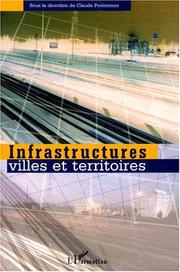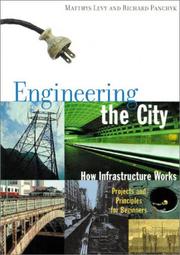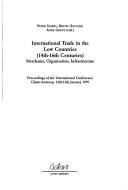| Listing 1 - 10 of 32 | << page >> |
Sort by
|
Book
Year: 2000 Publisher: [Place of publication not identified] Centre for Independent Studies
Abstract | Keywords | Export | Availability | Bookmark
 Loading...
Loading...Choose an application
- Reference Manager
- EndNote
- RefWorks (Direct export to RefWorks)
Infrastructure (Economics) --- Civil society --- New South Wales --- Social conditions.

ISBN: 1280087161 9786610087167 0585424586 0821348736 Year: 2000 Publisher: Washington, D.C. : World Bank : Public-Private Infrastructure Advisory Facility,
Abstract | Keywords | Export | Availability | Bookmark
 Loading...
Loading...Choose an application
- Reference Manager
- EndNote
- RefWorks (Direct export to RefWorks)
Infrastructure (Economics) --- Privatization --- Denationalization --- Privatisation --- Contracting out --- Corporatization --- Government ownership --- Capital, Social (Economics) --- Economic infrastructure --- Social capital (Economics) --- Social infrastructure --- Social overhead capital --- Economic development --- Human settlements --- Public goods --- Public works --- Capital

ISBN: 0415204348 1134629206 1280326301 0203183274 0429229313 9780203183274 9780415204347 9781134629206 9781134629152 9781134629190 1134629192 Year: 2000 Publisher: London New York Routledge
Abstract | Keywords | Export | Availability | Bookmark
 Loading...
Loading...Choose an application
- Reference Manager
- EndNote
- RefWorks (Direct export to RefWorks)
This book provides an integrated treatment of the relationship between political economy and vocational education at the beginning of the twenty-first century. Approaching the subject from a philosophical perspective the author engages with debates about* the work-related aims of education * the moral and spiritual significance of work * the conceptualisation of political economy * high-skill economies and vocational education* the 'end of work' thesis* the relationship between education and training in vocational education * future work patterns * the education
Vocational education --- Infrastructure (Economics) --- Philosophy. --- Economic aspects. --- Education, Vocational --- Vocational training --- Work experience --- Capital, Social (Economics) --- Economic infrastructure --- Social capital (Economics) --- Social infrastructure --- Social overhead capital --- Education --- Technical education --- Economic development --- Human settlements --- Public goods --- Public works --- Capital
Book
Year: 2000 Publisher: Washington, D.C., The World Bank,
Abstract | Keywords | Export | Availability | Bookmark
 Loading...
Loading...Choose an application
- Reference Manager
- EndNote
- RefWorks (Direct export to RefWorks)
Lessons learned from Chile's highly successful experience in introducing private capital into the transport infrastructure sector; To increase investment in infrastructure, in the early 1990s Chile's government introduced private capital into the transport infrastructure sector, covering roads and highways, bridges, tunnels, and airports. The chosen mechanism: a concession scheme through which private firms would finance and build a given project and then operate the infrastructure for a set number of years, recovering their investment by collecting tolls from users. Among lessons learned from the experience: As much as possible, avoid concessioning roads for which there are convenient alternative freeways nearby; Choose the right variable for awarding a concession. Avoid mechanisms that (by promoting large payments to the state or short-term concession periods) encourage high tolls, and if you choose to award a concession to the firm charging the lowest tolls, place a floor and ceiling on possible bids. The floor is to guarantee the concession's financial viability; the ceiling is to prevent inefficient traffic diversions. Ties at either end should be resolved by a second variable, such as the level of transfers between the state and the firm; Allow downward toll flexibility so that the concessionaire can react to unexpectedly low traffic flows, especially for certain types of vehicles; Pay special attention to the tendering mechanism and to the general incentive structure. There are limits to the pure least-present-value-of-revenue (LPVR) auction, but income guarantees do enhance liquidity. In fact, a minimum-income guarantee through an LPVR auction is an instrument for credit enhancement, not income support. Alternatively, some form of financial innovation should be encouraged to make debt service commitments more flexible; If concessions are tendered by traditional methods and income guarantees will be given, cover only a fraction of the concessionaire's expected income stream, to reduce the state's financial exposure and to improve the incentives to the concessionaire; Make the contracts as complete as possible but allow for later modifications or renegotiations, and include a well-designed dispute resolution mechanism. This paper - a product of Governance, Regulation, and Finance, World Bank Institute - is part of a larger effort in the institute to increase understanding of infrastructure regulation. Andres Gomez-Lobo may be contacted at agomezlo@decon.facea.uchile.cl.
Airport --- Airports --- Bottlenecks --- Costs --- Highways --- Infrastructure --- Investments --- Public Works --- Roads --- Route --- Safety --- Subsidies --- Toll --- Tolls --- Traffic --- Traffic Levels --- Transport --- Transport Economics, Policy and Planning --- Transport Infrastructure --- Tunnel --- Tunnels

ISBN: 2738491499 9782738491497 Year: 2000 Publisher: Paris : Harmattan,
Abstract | Keywords | Export | Availability | Bookmark
 Loading...
Loading...Choose an application
- Reference Manager
- EndNote
- RefWorks (Direct export to RefWorks)
Les mutations des infrastructures ont des incidences sur le cadre urbain, le territoire et les modes de vie, peu étudiées et mal comprises. Au XIXe, chemin de fer, électricité et eau courante. Au XXe, autoroutes, aéroports et télécommunications. Les chercheurs s'efforcent de suivre l'actualité en temps réel et d'apprécier les transformations sociales, pratiques et symboliques d'aujourd'hui...
Infrastructure (Economics) --- City planning --- Infrastructures de transport --- Urbanisme --- Congresses. --- Congrès --- Architecture --- Aesthetics. --- Aesthetics --- Infrastructure (Economics). --- Regional planning --- Aménagement du territoire --- Esthétique --- Congrès --- Infrastructure (Economics) - France - Congresses. --- Infrastructure (Economics) - Congresses. --- City planning - France - Congresses. --- City planning - Congresses. --- Architecture - Aesthetics. --- Architecture - Aesthetics
Book
ISBN: 926428169X 9282122573 Year: 2000 Publisher: Paris Conférence européenne des ministres des transports
Abstract | Keywords | Export | Availability | Bookmark
 Loading...
Loading...Choose an application
- Reference Manager
- EndNote
- RefWorks (Direct export to RefWorks)
L'intégration des marchés intérieurs européens est une question d'actualité qui a suscité de nombreuses actions au cours des dernières années. C'est également la condition sine qua non pour que les relations commerciales et l'activité économique se développent en Europe. Ce livre est un outil essentiel pour tous les professionnels des transports. Il analyse les tendances les plus récentes en matière de transports et d'investissements. Il examine ensuite le processus paneuropéen d'harmonisation des législations et d'adaptation des systèmes de transport et fait le point sur l'émergence de nouveaux itinéraires de transport entre l'europe et l'Asie. Les obstacles au transport international de marchandises par voies routière et ferroviaire lors des passages aux frontières font également l'objet d'un examen minutieux ainsi que la lutte contre la délinquance et la fraude. Enfin, cet ouvrage aborde la question des partenariats public-privé, qui suscite un intérêt croissant, et en tire un certain nombre de conclusions.
Transport --- Transportation --- Infrastructure (Economics) --- Transit, International --- Infrastructures de transport --- Transports internationaux --- International cooperation --- Planning --- Coopération internationale --- Planification

ISBN: 9781556524196 1556524196 Year: 2000 Publisher: Chicago, IL : Chicago Review Press,
Abstract | Keywords | Export | Availability | Bookmark
 Loading...
Loading...Choose an application
- Reference Manager
- EndNote
- RefWorks (Direct export to RefWorks)
Civil engineering --- Municipal engineering --- Génie civil --- Génie urbain --- Juvenile literature --- Ouvrages pour la jeunesse --- Génie civil --- Génie urbain --- Infrastructure

ISBN: 9780761966692 0761966684 0761966692 1446219917 1446229238 1282020587 9786612020582 1849202419 9781849202411 9781446219911 9780761966685 9781446229231 9781282020580 661202058X Year: 2000 Publisher: London Sage Publications
Abstract | Keywords | Export | Availability | Bookmark
 Loading...
Loading...Choose an application
- Reference Manager
- EndNote
- RefWorks (Direct export to RefWorks)
'The Ethics of Cyberspace' proposes a solution to the problem of how to organise digital technologies ethically in a democratic society.
Computers and civilization --- Computers --- Internet --- Moral and ethical aspects --- Computers and civilization. --- Moral and ethical aspects. --- Cyberspace --- Information superhighway --- Information technology --- Information ethics --- Data highway --- Data superhighway --- Digital highway --- Electronic superhighway --- Global information infrastructure --- I-way (Information superhighway) --- Infobahn --- Infopike --- Information highway --- Information infrastructure --- Infrastructure, Information --- National information infrastructure --- Superhighway, Information --- Information networks --- Information society --- Space and time --- Telematics --- Civilization and computers --- Civilization --- Ordinateurs et civilisation --- Ordinateurs --- Aspect moral --- Privacy --- Liberty --- 174 --- 621.39 INTERNET --- 681.3 INTERNET --- #SBIB:309H1015 --- #SBIB:309H103 --- #KVHA:Ethiek --- #KVHA:Informatica --- #KVHA:Internet --- Media: politieke, juridische, ethische, ideologische aspecten (incl. privacy) --- Mediatechnologie / ICT / digitale media: sociale en culturele aspecten --- Ethiek --- Censuur --- Vrijheid van meningsuiting --- Mediawetgeving --- Rechten van de mens --- Gedragscodes --- Recht --- Informatiesnelweg --- Mensenrechten --- Gedragscode --- Literatuur --- Godsdienst --- Sport --- Duurzaamheid --- Filosofie --- Psychologie --- Sociologie --- Man --- Noorwegen --- Cultuur --- Erfelijkheidsleer --- Stadssamenleving --- Technologie --- Voeding --- Maatschappij --- Verpleegkunde --- Vlaanderen --- Vlaams --- Emigratie --- Drank --- Gezondheid --- Volwassene --- Vrouw --- Computers - Moral and ethical aspects --- Internet - Moral and ethical aspects

ISBN: 9044110055 9789044110050 Year: 2000 Volume: 10 Publisher: Leuven : Garant,
Abstract | Keywords | Export | Availability | Bookmark
 Loading...
Loading...Choose an application
- Reference Manager
- EndNote
- RefWorks (Direct export to RefWorks)
History of the Netherlands --- Foreign trade. International trade --- History of Belgium and Luxembourg --- anno 1400-1499 --- anno 1300-1399 --- anno 1500-1599 --- Merchants --- Financial institutions --- Infrastructure (Economics) --- International trade --- History --- Congresses --- Social aspects --- Benelux countries --- Commerce --- Economic conditions --- Amsterdam (Nederland) --- Antwerpen --- Brugge --- Histoire du Commerce --- Histoire économique --- Pays-Bas (anciens) --- 338 <09> --- 339 <09> <491.9> --- -Infrastructure (Economics) --- -International trade --- -Merchants --- -Businesspeople --- External trade --- Foreign commerce --- Foreign trade --- Global commerce --- Global trade --- Trade, International --- World trade --- International economic relations --- Non-traded goods --- Capital, Social (Economics) --- Economic infrastructure --- Social capital (Economics) --- Social infrastructure --- Social overhead capital --- Economic development --- Human settlements --- Public goods --- Public works --- Capital --- Financial intermediaries --- Lending institutions --- Associations, institutions, etc. --- Economische geschiedenis --- Handelsgeschiedenis--De Nederlanden. Benelux --- -History --- -Benelux countries --- -Low countries --- -Congresses --- -Economische geschiedenis --- -Commerce --- 339 <09> <491.9> Handelsgeschiedenis--De Nederlanden. Benelux --- 338 <09> Economische geschiedenis --- -338 <09> Economische geschiedenis --- Businesspeople --- -External trade --- Low countries --- Congresses. --- art market --- Merchants - Benelux countries - History - Congresses. --- Financial institutions - Benelux countries - History - Congresses. --- Infrastructure (Economics) - Benelux countries - History - Congresses. --- International trade - Social aspects - Benelux countries - History - Congresses. --- Benelux countries - Commerce - History - Congresses. --- Benelux countries - Economic conditions - Congresses. --- Merchants - Benelux countries - History --- International trade - Social aspects - Benelux countries - History --- Financial institutions - Benelux countries - History --- Infrastructure (Economics) - Benelux countries - History --- Benelux countries - Economic conditions - Congresses --- Benelux countries - Commerce - History --- geschiedenis
Book
Year: 2000 Publisher: Washington, D.C., The World Bank,
Abstract | Keywords | Export | Availability | Bookmark
 Loading...
Loading...Choose an application
- Reference Manager
- EndNote
- RefWorks (Direct export to RefWorks)
Why did reform in Santiago improve water system performance, when similar reform attempts under public management in other countries failed? In the late 1980s, Chile planned to privatize Santiago's sanitary works enterprise (EMOS) but instead reformed it under public ownership. It did so through a regulatory framework that mimicked the design of a concession with a private utility, setting tariffs that ensured at least a 7 percent return on assets, creating a neutral regulator independent of ministry intervention, and giving EMOS the right to appeal the regulator's tariff decisions. This reform of Santiago's water system is often cited as a case of successful reform under public management. Comparing a comprehensive measure of welfare with a counterfactual example, Shirley, Xu, and Zuluaga show surprisingly large gains from Santiago's reform, given the relatively good initial conditions. (The gains accrued largely to government and employees, but consumers benefited from improved service and coverage.) Why did reform in Santiago improve water system performance, when similar reform attempts under public management in other countries failed? Chile has a long tradition of private water rights, shaped by early recognition that water is a scarce and tradable private good; The reformed regulatory framework was designed to attract private investors to the water system and to motivate them to operate efficiently and expand the system; Chile's unique electoral institutions sustained this framework under state operation after democracy was restored; Chile's strong bureaucratic norms and institutions (permitting little corruption), combined with Santiago's relatively low-cost water system, permitted prices that effectively increased quasi-rents for investing in the system while minimizing the risk of inefficiency or monopoly rents. The authors also address the question of why EMOS was reformed but not privatized, and what the costs of not privatizing were. The system was privatized in 1999, but the changes from privatization are likely to be less significant than those introduced in 1989-90. This paper - a product of Regulation and Competition Policy, Development Research Group - is part of a larger effort in the group to draw lessons from regulatory reform and understand political and institutional change. This study was funded by the Bank's Research Support Budget under the research project Competition and Privatization in Urban Water Supply (RPO 682-64). Mary Shirley may be contacted at mshirley@worldbank.org.
Bill Collection --- Cubic Meters --- Debt Markets --- Economic Theory and Research --- Finance and Financial Sector Development --- Financial Literacy --- Industry --- Infrastructure Economics and Finance --- Macroeconomics and Economic Growth --- Number Of Connections --- Price Of Water --- Private Participation in Infrastructure --- Private Sector Development --- Private Utility --- Public Works --- Sewage Treatment --- Sewerage Services --- Tariff Decisions --- Tariff Setting --- Tariff Setting Process --- Town Water Supply and Sanitation --- Urban Water --- Urban Water Supply --- Urban Water Supply and Sanitation --- Water and Industry --- Water Companies --- Water Conservation --- Water Consumption --- Water Resources --- Water Sector --- Water Services --- Water Supply and Sanitation --- Water Supply and Sanitation Governance and Institutions --- Water Supply and Systems --- Water System --- Water Systems --- Water Tariffs
| Listing 1 - 10 of 32 | << page >> |
Sort by
|

 Search
Search Feedback
Feedback About
About Help
Help News
News